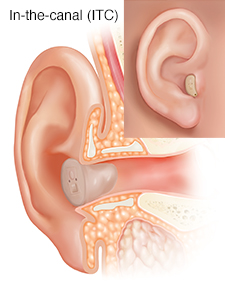Losing your hearing can be frustrating. But hearing aids can help you hear what you’ve been missing. Not everyone who has hearing loss needs hearing aids. Hearing aids will most likely help you if your hearing loss:
-
Keeps you from communicating with others.
-
Prevents you from hearing warning sounds, such as a car horn.
What hearing aids do
After getting used to your new hearing aids, you may find that:
-
You hear and understand speech better in many cases.
-
You’re able to join in when talking with a group of people.
-
You hear certain speech sounds more clearly.
-
You can hear warning signs that help you stay safe, such as a smoke alarm or car horn.
-
Life is more enjoyable for you and the people around you.
Hearing aids can also reduce the risk of dementia in the high-risk population.
How hearing aids help you hear
Hearing aids help by making most sounds clearer for the brain. Sounds that you can’t hear as well are made louder. Hearing aids also filter sound to reduce some background noise. And they soften some sounds that may be too loud. As a result, signals traveling to the brain are easier to understand.
The microphone picks up sound and carries it into the hearing aid. The amplifier makes the sound louder and clearer. The receiver sends this stronger sound into the ear canal. The stronger sound travels the rest of the way into the ear to the brain.
Living with hearing aids
New technology has made today’s hearing aids better than ever. To be sure you have the hearing aids best suited to your needs, have an evaluation by a licensed audiologist. Your hearing still won’t be perfect. You may not hear all sounds. And you won’t hear only the things you want to. In noisy places, you may still have trouble hearing speech clearly. But you can also learn methods for better listening. These methods, used together with hearing aids, will help you understand what’s happening around you much better.


